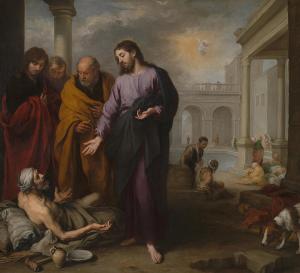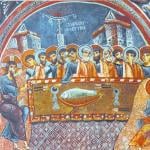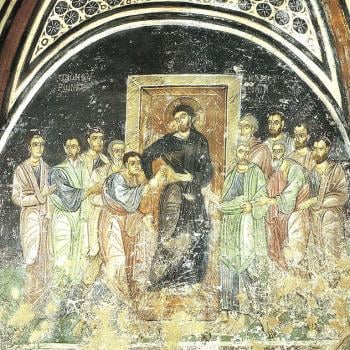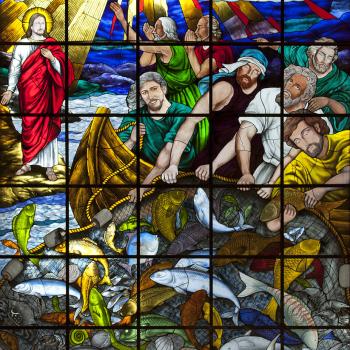
Some of the Sundays after Pascha (until the Ascension) use events from Jesus’s ministry to reflect upon the ways Christ’s resurrection of the dead can and should affect us. This is done by having us read into the events from his ministry as representing spiritual truths, where what happens physically in the story can be said to be happening with us spiritually (if, of course, we are open to and accept Jesus’ grace). Thus, we not only learn of the miracles Jesus did, miracles which had many come to him and believe in him and become his disciples, but the miracles which he continues to do, indeed, miracles which happen on a deeper level in and with us thanks to his resurrection from the dead. Those who were blind and made so that they could once again see show us how we can be made to see and experience spiritual realities thanks to Christ; those who were paralyzed in some way reveal to us the way we are spiritually paralyzed thanks to our sin, and now, in the light of the resurrection, we can be liberated and made free, free from all forms of bondage, free from the darkness which keeps us spiritually blind, because, in and through Christ, we have the source of living water, the one who gives us the Holy Spirit. “Wherever Jesus appears, there is salvation. If He sees a revenue officer sitting in his office, He makes him an apostle and evangelist. Laid in the grave, He raises the dead to life. He bestows sight on the blind, hearing on the deaf.” [1] This is why, in the Byzantine tradition, the fourth Sunday after Easter focuses on the way Jesus healed a paralytic man:
After this there was a feast of the Jews, and Jesus went up to Jerusalem. Now there is in Jerusalem by the Sheep Gate a pool, in Hebrew called Bethzatha, which has five porticoes. In these lay a multitude of invalids, blind, lame, paralyzed. One man was there, who had been ill for thirty-eight years. When Jesus saw him and knew that he had been lying there a long time, he said to him, “Do you want to be healed?” The sick man answered him, “Sir, I have no man to put me into the pool when the water is troubled, and while I am going another steps down before me.” Jesus said to him, “Rise, take up your pallet, and walk.” And at once the man was healed, and he took up his pallet and walked (Jn. 5:1-9b RSV).
The paralytic man was beside others who also needed healing. It appears it was not their time to be healed, for Jesus came to the paralytic who had been paralyzed for a long time, to show us no matter how long someone has been wounded by sin, Jesus can still heal them. This is important for us, for it gives us hope, so that, no matter how long we find ourselves struggling with our sins and the habits they have formed in us, Jesus can come to us and heal us from our spiritual infirmity. If we are willing, if we truly desire to be freed, we will struggle against them, and as we struggle, Jesus can and will come to us with mercy and grace, giving us what we need to rise up and be free. It might take a lifetime of struggle, we might even find we will need some healing even after death, but if we are open, Jesus will give us the grace, the energy, we need to slowly get up and find ourselves free, so that in eternity, we will experience the freedom which we desire. In that freedom, we will find God is open to giving us more grace, and with it, we will find ourselves becoming even greater, having even greater potential, as we will become more and more like God, partaking more and more of the absolute freedom which God alone innately possesses.
The more we are given, the more we continue to grow, the more we should look forward, not backwards, because if we look backwards, we might find our old ways slowly creeping back in, taking over and binding us to the patterns which they formed, to the bad habits which we desire to overcome. This is something which is also represented in the story of the paralytic man by the way Jesus told him to go and sin no more:
Now the man who had been healed did not know who it was, for Jesus had withdrawn, as there was a crowd in the place. Afterward, Jesus found him in the temple, and said to him, “See, you are well! Sin no more, that nothing worse befall you (Jn. 5:13-14 RSV).
The more we have been given, the more responsibility we will have; if we do not properly engage the new level of freedom we have been given, we risk not only losing what we have gained, but finding ourselves becoming worse than before. The paralytic man was told to sin no more, and so we, likewise, are told to sin no more, but of course, when we have not experienced the full freedom or liberation from our bad habits, when we find ourselves, in and through our habits, constantly doing things which we wish we would not do (or at least, a part of us wishes not to, because a part of us might, due to some pleasure we get from such actions, also wish to do such things), we have not been fully liberated and so our culpability for our actions are likewise limited (which is why bad habits connected to grave sins, though they have the possibility of being mortal sins, tend not to be). What is important is for us to desire to be healed, to be like the paralytic man, willing to follow after Christ and what he tells us to us once we are liberated. We should seek to not only achieve our natural potential, the potential inherent in us through our human nature, but to join ourselves with God, and in doing so, find ourselves becoming greater than we could ever imagine.
[1] St. Cyril of Jerusalem, “Sermon on the Paralytic” in The Works of Saint Cyril of Jerusalem. Volume 2. Trans. Leo P. McCauley, SJ and Anthony A. Stephenson (Washington, DC: CUA Press, 1970), 209.
Stay in touch! Like A Little Bit of Nothing on Facebook.
If you liked what you read, please consider sharing it with your friends and family!
N.B.: While I read comments to moderate them, I rarely respond to them. If I don’t respond to your comment directly, don’t assume I am unthankful for it. I appreciate it. But I want readers to feel free to ask questions, and hopefully, dialogue with each other. I have shared what I wanted to say, though some responses will get a brief reply by me, or, if I find it interesting and something I can engage fully, as the foundation for another post. I have had many posts inspired or improved upon thanks to my readers.













